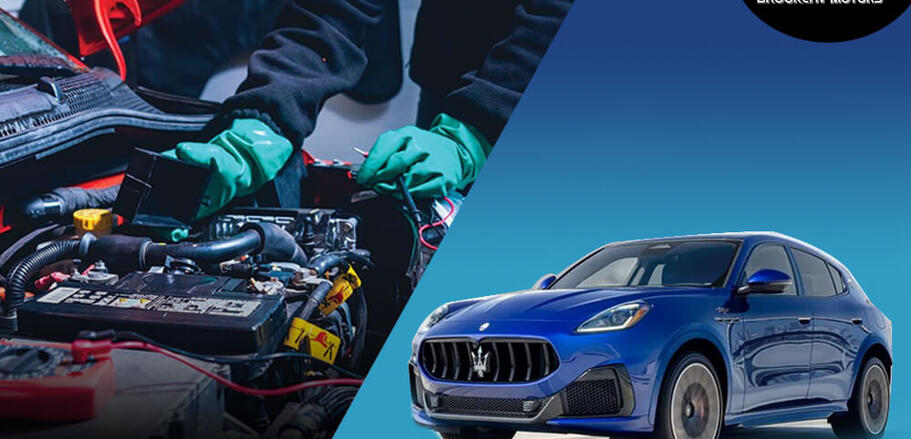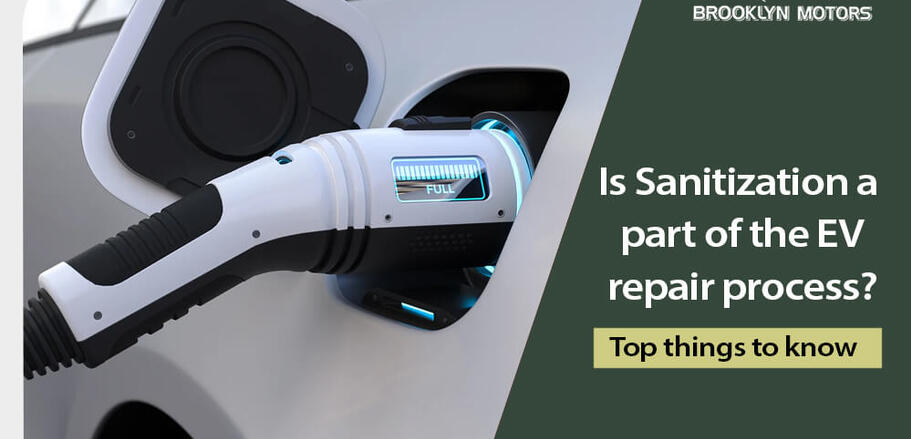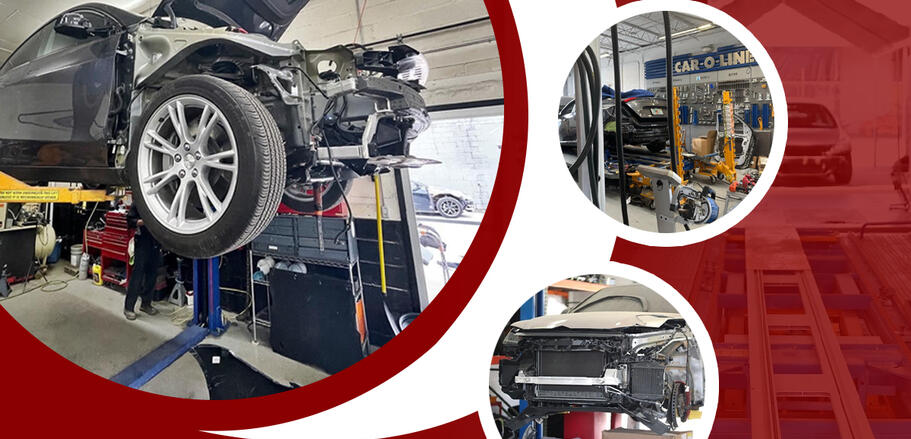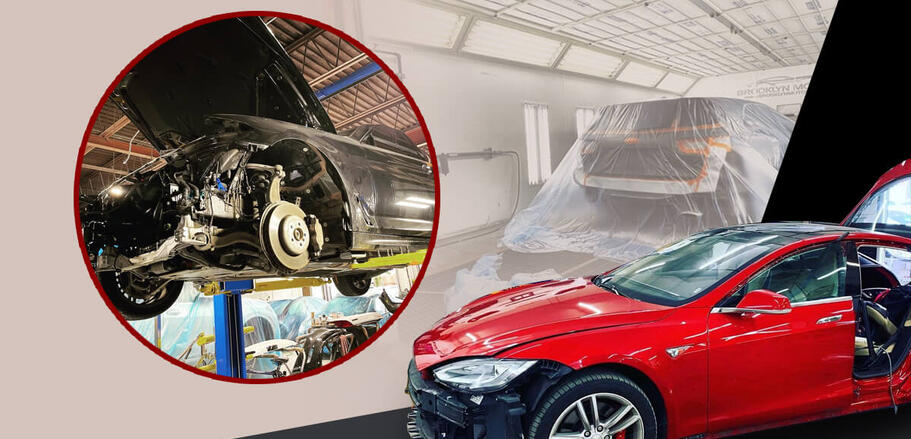
 June 17, 2024
June 17, 2024As electric vehicles (EVs) continue to surge in popularity, owners need to understand that routine maintenance and servicing are still required – it just looks a bit different from a traditional gas-powered car. Let's explore some of the key components involved in keeping your EV running smoothly with electric car servicing New York.
The Battery Pack Inspection
Since the battery pack is the literal heart powering your electric ride, it gets special attention during service. Technicians will thoroughly inspect the high-voltage battery system, checking for any signs of damage, degradation, or loss of efficiency and range over time.
Diagnostic scans ensure the battery management system is functioning optimally. In some cases, maintenance may involve re-balancing individual cell levels or even replacing modules within the pack if needed. It's a meticulous process at the electric car repair shop in New York to preserve your EV's most precious component.
Brake and Tire Services
While EVs ditch the traditional engine oil and transmission fluid changes, the brake system still requires regular attention. Brake pads, discs/rotors, and hydraulic fluid levels will be inspected and components replaced as needed, just like a gas car.
Tires are also a big focus. The increased weight of those heavy battery packs can accelerate tire wear, so rotation, balancing, and reviewing the tread life are always prudent during service visits.
Cooling System Upkeep
Electric cars rely on liquid cooling systems to keep the battery pack, power electronics, and motor from overheating during operation. Just like a gas vehicle's radiator coolant, this specialized fluid needs periodic draining, flushing, and replacement to maintain peak efficiency.
The cooling pumps, hoses, and other components will also get a thorough diagnostic inspection to ensure no leaks or failures are brewing that could lead to overheating issues down the road.
Body and Chassis Care
Of course, all the same, traditional inspections and maintenance apply to the non-electric portions of your EV's body and chassis as well. Suspension system checks, steering and alignment adjustments, windshield wiper replacement, lighting functionality tests, cabin air filter replacements, and more.
Technicians will also scan for any fault codes related to the electric power steering, traction control, anti-lock brakes, and vehicle control modules to catch any issues early. No stone is left unturned!
The EV Expertise Factor
While many service basics carry over, there's no substitute for having your EV serviced by experienced technicians who've received specialized training in electric vehicle systems from the manufacturer. They know the inner workings and unique needs of your specific EV model inside and out.
So don't skip out on service just because it's an electric car. With the right expertise and some key inspections, you can keep that green ride purring like a... ultra-quiet, zero-emissions vehicle for years to come!

 March 28, 2024
March 28, 2024We're all familiar with the importance of keeping the insides of our gas-powered cars clean. From vacuuming up crumbs to wiping down surfaces, basic interior detailing helps vehicles stay fresh. But what about electric vehicles (EVs) - do they require any special sanitization during repair or maintenance work?
Understanding high-voltage components
One key distinction with EVs is the presence of high-voltage components like the large traction battery pack and connections to the electric motor. While not necessarily "dirty" in the traditional sense, these components do require specific safety protocols during repair situations.
Isolating the high-voltage system
Whenever an EV repair technician needs to access the high-voltage system, rigorous isolation procedures must be followed. This involves safely deactivating the high-voltage circuitry and ensuring no lingering electrical potential. Only after this process can sanitization or other work commence.
Sanitizing workspaces and components
In addition to the high-voltage components themselves, the areas around where repairs take place need to be kept clean too. Maintenance technicians for EV specialized auto body shop near me will thoroughly clean repair benches, tools, carts, and anything else involved with disassembly. Components like battery packs may be sanitized before reassembly as well.
Cleaning and detailing the interior
Just like a gas car, the interior cabin areas of an EV can accumulate dirt, debris, stains, and odors over time. During major repair work involving removing large components, it's common practice to thoroughly clean and detail the exposed interior areas too. Vacuuming, steaming, shampooing – the complete detailing regimen.
Sanitization for electric powertrains and motors
While there's no exhaust system or typical "engine bay" to clean, electric motors and surrounding components still require periodic sanitization. Repair shops for EV car repair near me use specialized degreasers, cleaning solutions, and tools to ensure these areas stay shipshape.
Taking sanitization seriously
Overall, certified repair facilities do incorporate comprehensive sanitization practices into their EV repair and maintenance protocols. Given the complex high-voltage systems involved, keeping everything scrupulously clean is of paramount importance for safety and longevity.
The next time you bring your electric vehicle in for service, you can feel confident that expert-level sanitization will be part of the process. After all, today's EVs are marvels of cutting-edge technology deserving of a spotless repair environment!

 January 29, 2024
January 29, 2024One of the key skills for electric car technicians is the ability to make an accurate diagnosis of electrical and mechanical faults. The diagnosis of problems with electric vehicles needs knowledge regarding electric systems, battery technology, and electronic drive trains.
Technicians have to locate problems by using diagnostic instruments and computer scanning equipment. The power of logic and troubleshooting enables techs to trace a problem to the source. They integrate diagnostics with knowledge of car subsystems to pinpoint and focus on problems quickly.
Working knowledge of electronics
Electric vehicles have vast electronics and embedded systems that need specialized diagnostic and repair knowledge to be used for an internal combustion engine. Techs have to know the electronic components and use tools like multimeters and oscilloscopes.
They should be conversant with electronic control units, sensors, high-voltage systems, and circuitry. Knowledge of programming, software calibration, and over-the-air updates is also necessary for the maintenance and optimization of current electric cars.
Battery expertise
The most complicated component of electric cars is the high-voltage battery packs. Techs need to know the chemistry and cell structures of lithium-ion batteries. They should be able to undertake proper servicing, testing, and replacement of battery modules as well as cooling systems.
Knowledge of battery management systems and charging needs is also necessary. Hazardous battery chemicals should be properly handled, stored, and disposed of as a safety requirement. The need for continuous training of an electric car specialist Brooklyn on emerging battery technologies is paramount as systems evolve rapidly.
Adherence to safety protocols
Safety and isolation procedures should be strictly followed when working with high-voltage systems because the electric shock is lethal. Before servicing, techs are to use personal protective equipment and turn off electrical hazards correctly. They should adhere to the safety guidelines for handling high-voltage elements, dangerous chemicals, and lift operations. Safety risks and safety procedures are the priority for electric vehicle technology.
In summary, electric car technicians have to learn electrical systems, electronics, batteries, and safety procedures. The key factors for zero-emissions vehicles are diagnosis skills, equipment knowledge, and safety compliance. With the necessary skills, such electric car servicing New York centers ensures that electric vehicles are road-worthy.

 January 22, 2024
January 22, 2024With the rise of EVs, collision centers are presented with the challenge of repairing advanced automobiles. Electric vehicles are designed with a sophisticated battery system, employing advanced materials and intricate electronics that require specific methods to perform the necessary repairs economically and safely. Let’s explore some of the main repair methods utilized by electric car collision centers to transform these cars back into prime condition after an accident.
Battery inspection and diagnostics
The most essential part of an electric car is its battery. After an accident, it is necessary to determine what effect the crash had on this vital part. Electric car collision centers utilize modern diagnostic equipment for assessing the battery system's integrity. This entails verifying hidden damages and maintaining the integrity of the battery’s structure.
Specialized training for technicians
Electric vehicles require a specialized skill set and knowledge for repair. Electric car collision centers do train technicians in specialized training programs that allow them to comprehend the differences between EV systems and others. This involves education about dealing with high-voltage parts, safety guidelines, and knowledge of electric propulsion systems for accurate analysis and maintenance.
Aluminum repair expertise
Light aluminum frames are a common feature of electric vehicles to compensate for the battery weight. Repairing aluminum needs some special methods and equipment. Electric car collision centers invest in aluminum repair skills, which can handle dents, cracks, or structural damages on time. An electric car collision center NYC guarantees that the vehicle’s initial structure is preserved.
Computerized diagnostics and calibration
Electric cars are provided with advanced computer systems, which take care of diverse functions such as safety measures, sensors, and self-driving features. After an accident, these systems may need to be re-calibrated to work properly. Specialized diagnostic equipment has been developed by the collision centers for electric cars that include system checks and recalibrations.
Electric car collision centers use different specialized methodologies to tackle the challenges of electric cars. EV owners can rest assured that after a collision, their vehicles are still safe, efficient, and aesthetically pleasing thanks to the service of an electric car repair shop in New York.
 2575 Stillwell Ave,
2575 Stillwell Ave, 






